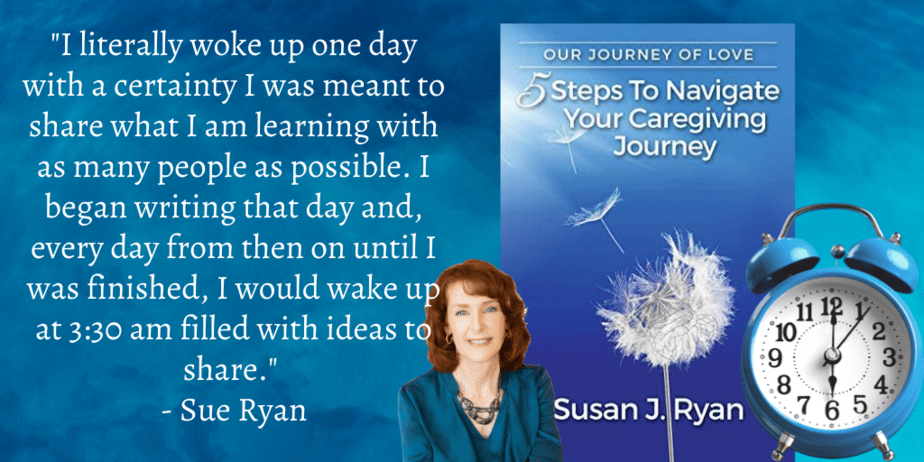By Sue Ryan
When I began my first role in caregiving for a friend more than thirty years ago, I didn’t know what to do. One day something worked, the next day it didn’t. I felt like I was on an emotional roller coaster blindfolded. Several of us joined together to provide support and it was frustrating for all of us. We felt helpless and hopeless, lacked resources or information to guide us. I vowed I wouldn’t ever let this happen again, and I began to learn.
In the years since then, I’ve had opportunities to learn in a variety of caregiving roles including those with friends, my grandmother, my father, and now my husband. When we received my husband’s diagnosis I said to him “We’re beginning a new chapter in our journey of love.” I had no idea then it would one day become part of chapters in a book!
I’ve moved from the frustration of feeling helpless and hopeless in my caregiving role to feeling positive and balanced. I am now able to focus on my care receiver and having our most positive journeys using the lessons, tips, and strategies I’ve learned, and those others have shared.
 Several passions in my life came together to inspire me to write Our Journey of Love, 5 Steps to Navigate Your Caregiving Journey. The most important one is my passion for everyone to live their best life. I literally woke up one day with a certainty I was meant to share what I am learning with as many people as possible. I began writing that day and, every day from then on until I was finished, I would wake up at 3:30 am filled with ideas to share.
Several passions in my life came together to inspire me to write Our Journey of Love, 5 Steps to Navigate Your Caregiving Journey. The most important one is my passion for everyone to live their best life. I literally woke up one day with a certainty I was meant to share what I am learning with as many people as possible. I began writing that day and, every day from then on until I was finished, I would wake up at 3:30 am filled with ideas to share.
The perspective I share in Our Journey of Love developed through the integration of areas of my life – my personal experiences, my caregiving experiences, my professional experiences, my faith experiences, and my recovery support experiences. I am incredibly grateful to everyone who has leaned in to support my journey over the years so I can positively support the journeys of others.
People often share with me that before learning of my book they hadn’t been able to even consider a positive perspective and explain my perspective of massive acceptance and radical presence has positively changed their perspective on caregiving.
I’ve received positive feedback from people who appreciated reading a book they could relate to, that was authentic, honest, and filled with practical tips and strategies they can implement in their caregiving journeys. I’m happy it’s helping so many people that it was recognized as an international best-selling book.
Here are a few of the reviews it’s received:
John Beahn: A wonderful and insightful perspective on dual journeys of both care giver and care receiver. Important practical application on the emotional requirements of both parties. A great resource for this difficult part of our lives. Recommend for families of affected people.—-wonderful research tools and especially the need for caregiver tools along this journey. This book is a gift—–thank you Sue.
Diana Walsh: Whether you are caring for a loved one whose memory is fading, worrying about your own lapses in memory, or simply eager to understand better a situation we all face in one form or another as we age, this is an excellent place to begin. Sue Ryan knows the territory and offers a practical, expert, and wise guide for navigating it.
About the Author

Sue Ryan is a speaker, coach, founder of Our Journey of Love, and author of the international best-selling book Our Journey of Love: 5 Steps to Navigate Your Caregiving Journey. Sue’s positive perspective on caregiving is the result of investing more than 30 years learning lessons in a variety of caregiving roles as well as the intersection of other areas in her life including her professional career in application software sales and as a coach and speaker specializing in individuals becoming their greatest leading themselves and others. She is also the world’s luckiest Nana to five grandchildren and three great-grandchildren.
Connect with Sue Ryan
Email:



One Response
As a nurse and trainer the most difficult training to find that helps the families, carers and professionals to care for an individual with dementia is training on behaviours that challenge.